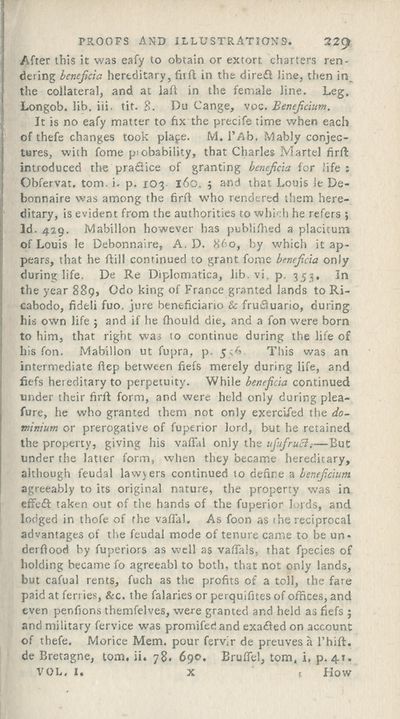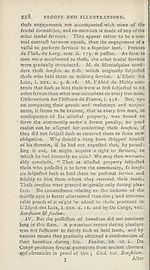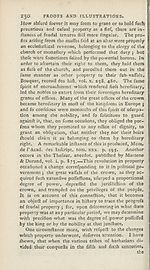Download files
Complete book:
Individual page:
Thumbnail gallery: Grid view | List view

PROOFS and illustrations. 229
After this it was eafy to obtain or extort charters ren¬
dering beneficia hereditary, fitft in the direfl line, then in.
the collateral, and at laft in the female line. Leg.
Longob. lib. iii. tit. S. Du Cange, voc. Benejicium.
It is no eafy matter to fix the precife time when each
of thefe changes took plafe. M. 1’Ab. Mably conjec¬
tures, with fome ptobability, that Charles Martel firft
introduced the prafiice of granting beneficia for life :
Obfervat. tom. i. p. 103 160. 5 and that Louis le De-
bonnaire was among the firfl who rendered them here¬
ditary, is evident from the authorities to which he refers ;
Id. 429. Mabillon however has pubhfhed a placitum
of Louis le Debonnaire, A. D. 8to, by which it ap¬
pears, that he (till continued to grant fome brnejicta only
during life. De Re Diplomatics, lib vi. p 353. In
the year 889, Odo king of France granted lands to Ri-
cabodo, fideli fuo. jure bentficiario & fruffuano, during
his own life ; and if he fhould die, and a fon were born
to him, that right was to continue during the life of
his fon. Mabillon ut fupra, p. 55^. This was an
intermediate Hep between fiefs merely during life, and
fiefs hereditary to perpetuity. While benejicia continued
under their firft form, and were held only during plea-
fure, he who granted them not only exerci/ed the do¬
minium or prerogative of fuperior lord, but he retained
the property, giving his valfal only the ufufrucii—But
under the latter form, when they became hereditary,
although feudal lawyers continued to define a benejicium
agreeably to its original nature, the property was in
effefl taken out of the hands of the fuperior Lids, and
lodged in thofe of the vaffal. As foon as the reciprocal
advantages of the feudal mode of tenure came to be un*
det flood by fuperiors as well as vaffals, that fpecies of
holding became fo agreeabl to both, that not only lands,
but cafual rents, fuch as the profits of a toll, the fare
paid at ferries, &c. the falaries or perquifites of offices, and
even penfions themfelves, were granted and held as fiefs ;
and military fervice was promifedand exadled on account
of thefe. Morice Mem. pour fervir de preuves a I’hift.
de Bretagne, tom. ii. 78. 690. Brulfel, tom. i. p. 41.
VOL. I. X 1 How
After this it was eafy to obtain or extort charters ren¬
dering beneficia hereditary, fitft in the direfl line, then in.
the collateral, and at laft in the female line. Leg.
Longob. lib. iii. tit. S. Du Cange, voc. Benejicium.
It is no eafy matter to fix the precife time when each
of thefe changes took plafe. M. 1’Ab. Mably conjec¬
tures, with fome ptobability, that Charles Martel firft
introduced the prafiice of granting beneficia for life :
Obfervat. tom. i. p. 103 160. 5 and that Louis le De-
bonnaire was among the firfl who rendered them here¬
ditary, is evident from the authorities to which he refers ;
Id. 429. Mabillon however has pubhfhed a placitum
of Louis le Debonnaire, A. D. 8to, by which it ap¬
pears, that he (till continued to grant fome brnejicta only
during life. De Re Diplomatics, lib vi. p 353. In
the year 889, Odo king of France granted lands to Ri-
cabodo, fideli fuo. jure bentficiario & fruffuano, during
his own life ; and if he fhould die, and a fon were born
to him, that right was to continue during the life of
his fon. Mabillon ut fupra, p. 55^. This was an
intermediate Hep between fiefs merely during life, and
fiefs hereditary to perpetuity. While benejicia continued
under their firft form, and were held only during plea-
fure, he who granted them not only exerci/ed the do¬
minium or prerogative of fuperior lord, but he retained
the property, giving his valfal only the ufufrucii—But
under the latter form, when they became hereditary,
although feudal lawyers continued to define a benejicium
agreeably to its original nature, the property was in
effefl taken out of the hands of the fuperior Lids, and
lodged in thofe of the vaffal. As foon as the reciprocal
advantages of the feudal mode of tenure came to be un*
det flood by fuperiors as well as vaffals, that fpecies of
holding became fo agreeabl to both, that not only lands,
but cafual rents, fuch as the profits of a toll, the fare
paid at ferries, &c. the falaries or perquifites of offices, and
even penfions themfelves, were granted and held as fiefs ;
and military fervice was promifedand exadled on account
of thefe. Morice Mem. pour fervir de preuves a I’hift.
de Bretagne, tom. ii. 78. 690. Brulfel, tom. i. p. 41.
VOL. I. X 1 How
Set display mode to:
![]() Universal Viewer |
Universal Viewer | ![]() Mirador |
Large image | Transcription
Mirador |
Large image | Transcription
| Antiquarian books of Scotland > Kings & rulers > History of the reign of the Emperor Charles V. > Volume 1 > (247) |
|---|
| Permanent URL | https://digital.nls.uk/109185295 |
|---|
| Description | By William Robertson. London : Cadell and Davies, 1798. |
|---|---|
| Shelfmark | ABS.1.76.13 |
| Additional NLS resources: | |
| Description | Thousands of printed books from the Antiquarian Books of Scotland collection which dates from 1641 to the 1980s. The collection consists of 14,800 books which were published in Scotland or have a Scottish connection, e.g. through the author, printer or owner. Subjects covered include sport, education, diseases, adventure, occupations, Jacobites, politics and religion. Among the 29 languages represented are English, Gaelic, Italian, French, Russian and Swedish. |
|---|

